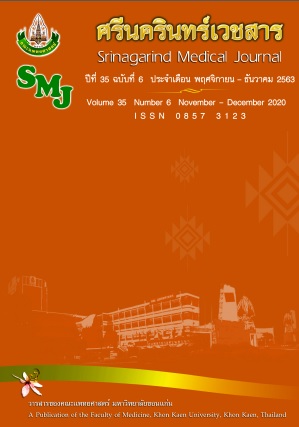The Effect of Overnight Fasting on Stroke Volume Index Measured by Whole Body Impedance Cardiography
Keywords:
Whole body impedance cardiography; stroke volume index; fasting, hypovolemiaAbstract
Background and Objecitve: Preoperative fasting is recommended to prevent pulmonary aspiration. Fasting induces hypovolemia. Intravenous fluid infusion is commonly given during anesthesia to minimize the risk of hypotension. However, intravenous fluid overload has been shown to deteriorate patient outcome. From previous literatures, the effect of preoperative fasting on intravascular volume is still inconclusive. There is no previous study that assesses intravascular volume status before and after fasting using the whole body impedance cardiography which is a non-invasive, practical and operator-independent. The reliability of whole body impedance cardiography is comparable to pulmonary artery thermodilution which is gold standard. In this study, we assessed stroke volume index (SVI) before and after fasting for 8 to 10 hours using whole body impedance cardiography.
Methods: This is prospective observational study. We included volunteers with American society of anesthesiologists (ASA) physical status classification I–II with age between 18-65 years old. SVI and other hemodynamic parameters were measured before and after fasting using whole body impedance cardiography. The absolute change of hemodynamic parameters before and after fasting more than 10% indicated clinical significance. P value < 0.05 indicates statistical significance.
Results: Sixty-two volunteers were enrolled and completed the study. SVI before and after overnight fasting were 40.0±8.7 mL/m2 and 37.7±8.2 mL/m2, respectively. SVI after fasting was decreased 5.5%. The percentage absolute change of SVI in individual volunteer was in a range between 3.1% to -17.0%. Twelve subjects (19.4%) have decreased in SVI. Stroke volume (SV), cardiac output (CO) and cardiac index (CI) were decreased 5.6%, 6.6% and 6.4%, respectively. All hemodynamic parameters except heart rate were statistically decreased after fasting (p-value < 0.05) but the absolute change less than 10%.
Conclusion: Overnight fasting does not clinically affect SVI measured by whole body impedance cardiography in healthy population. Some volunteers have significantly decreased in SVI after fasting and appropriate intravenous fluid therapy probably improves CO.
References
2. American Society of Anesthesiologists Committee. Practice Guidelines for Preoperative Fasting and the Use of Pharmacologic Agents to Reduce the Risk of Pulmonary Aspiration: Application to Healthy Patients Undergoing Elective Procedures. Anesthesiology 2017; 126: 376-393
3. Chappell D, Jacob M, Hofmann-Kiefer K, Cozen P, Rehm M. A rational approach to perioperative fluid management. Anesthesiology 2008; 109: 723-740.
4. Doherty M, Buggy DJ. Intraoperative fluids: how much is too much? Br J Anaesth 2012; 109: 69-79.
5. Holte K, Kehlet H. Compensatory fluid administration for preoperative dehydration – does it improve outcome? Acta Anaesthesiol Scand 2002; 46: 1089–1093.
6. Lobo SM. Restrictive strategy of intraoperative fluid maintenance during optimization of oxygen delivery decrease major complication after high-risk surgery. Crit Care 2011; 15: R226.
7. Thacker JK, Mountford WK, Ernst FR, Michille RK, Michael MGM. Perioperative fluid utilization variability and association with outcomes: considerations for enhanced recovery efforts in sample US surgical populations. Ann Surg 2016; 263: 502–510.
8. Makaryus R, Miller TE, Gan TJ. Current concepts of fluid management in enhanced recovery pathways. Br J Anaesth 2018; 120(2): 376-383.
9. Bundgaard-Nielsen M, Jorgensen CC, Secher NH, Kehlet H. Functional intravascular volume deficit in patients before surgery. Acta Anaesthesiol Scand 2010;54:464-469.
10. Jenstrup M, Ejlersen E, Mogensen T and Secher NH. A Maximal Central Venous Oxygen Saturation (SvO2max) for the Surgical Patient. Acta Anaesthesiol Scand 1995;107:29-32.
11. Muller L, Brière M, Bastide S, Roger C, Zoric L, Seni G, et al. Preoperative fasting does not affect haemodynamic status: a prospective, noninferiority, echocardiography study. Br J Anaesth 2014; 112:835–841.
12. Kiefer N, Rode C, Baehner T, Zenker S, Hoeft A. Fasting before elective surgery does not
result in hypovolaemia: A prospective, observational study. Eur J Anaesthesiol 2018; 35: 539–
552.
13. Kanu C. The Swan-Ganz Catheters: Past, Present, and Future A Viewpoint, Circulation 2009; 119: 147-152.
14. Gad C, Yaron M, Edo K, Amram JC, Hilton M, Daniel G, Zvi V. Accurate, noninvasive continuous monitoring of cardiac output by whole-body electrical bioimpedance. Chest 2004; 125; 1431-1440.
15. Oscar LP, Junya S, Toshiro S, Satoshi W, Hiromasa O, Daisuke M, et al. Impedance Cardiography for Cardiac Output Estimation: Reliability of Wrist-To-Ankle Electrode Configuration. Cir J 2006;70(9): 1164-1168.
16. Lamke LO, Nilsson GE, Reithner HL. Insensible perspiration from the skin under standardized environmental conditions. Scan J Clin Lab Invest 1977; 37: 325-331.




